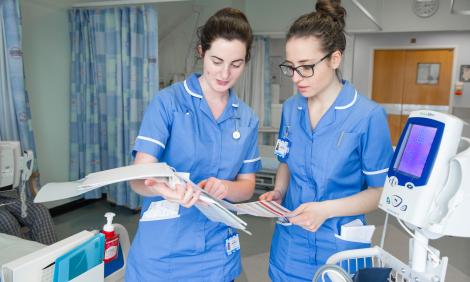From student to newly qualified
Making the transition from student to newly-qualified practitioner can seem like a big step.
It’s not unusual to feel anxious about what will be expected of you and how much support you’ll get on your preceptorship or initial training period.

This page has advice and tips on how to prepare for work, how to get the best out of your preceptorship or initial training period and give tips to make the transition as worry free as possible. Our real-life stories will show you how two students have successfully made this transition.
Preparing for work
Find out what you need to do to register with the regulatory body for your healthcare profession. Your university will be able to advise you on the steps you need to take to register and you should visit the appropriate regulatory body website for full details. Check the role page on this website for your profession to find out which body that is. Consider setting up or joining an existing social media group to keep in touch with other students. When you leave your course this can be a useful way of supporting each other. But make sure you’re aware of any guidance from your professional body, trade union or regulatory body about using social media, for example the Nursing and Midwifery Council, the Health and Care Professions Council, the General Medical Council etc.
The notes and assignments from your course will be a useful resource in your first few weeks of work so make sure you can find the information you’ll need easily.
Your preceptorship or initial training period
Preceptorships and initial training periods can differ a great deal. You may be supervised for the first few weeks or you may be expected to work independently from day one. In most cases you should have a named preceptor or mentor who is your first point of contact for support and who will be able to provide honest feedback on both your progress and areas for improvement.
"Nurses and midwives are not expected to be competent in everything. After a short period of being supervised you gradually take on more responsibilities until you are working as a fully autonomous practitioner. The most important thing to remember is that you should speak up if you don’t feel supported." Danielle Nixon, practice development midwife, St Thomas’ Hospital
What's expected?
- in a busy environment being organised is very important. Prioritise what you need to do at the start of each shift
- clinical judgement and decision making takes time and confidence. Admit to mistakes and reflect on how you could do better next time. Always remember that patient safety comes first
- you must work within the limits of your competence. If you’re questioned about why you did something a certain way make sure you can refer to the guidelines you followed. These may be legal, for example Nursing and Midwifery Council (NMC) guidelines on medicine management, or evidence-based guidance on the treatment and management of conditions, or local trust/employer procedures
- unlike the structured learning of your course, responsibility for your continuing professional development (CPD) is yours. Always keep your e-portfolio up to date
Find out more about professional development.
Real-life stories
Read real-life stories from midwife Sian Hersey-Walker and physiotherapist Emily Holding about life after qualifying.
-
- ask questions and seize every learning opportunity as there will be less time for this when your initial training period is over
- remember what you have been taught about evidence-based care. Question what you are doing and provide evidence for why things are done in a certain way
- bear in mind that as a newly qualified practitioner you may have knowledge of the most up-to-date way of doing something and other staff may value this
- you may have study days to learn or develop skills such as suturing, cannulation and wound care, caring for patients with dementia, end-of-life care, dealing with acute pain or training on procedures such as what to do in emergency situations. You may also be offered topics such as leadership skills and how to mentor students.
-
You may need to be a member of a professional body to be able to access some of its online resources, but check out the professional body for your profession to see if it provides particular support for newly qualified staff. For example:
- the Royal College of Nursing (RCN) provides a resource for its student members - Newly registered nurses – Starting Your Career
- Flying Start NHS Scotland
- Northern Ireland Practice and Education Council for Nursing and Midwifery
- Health in Wales
- Chartered Society of Physiotherapy
- Society of Radiographers
- British Dietetic Association




